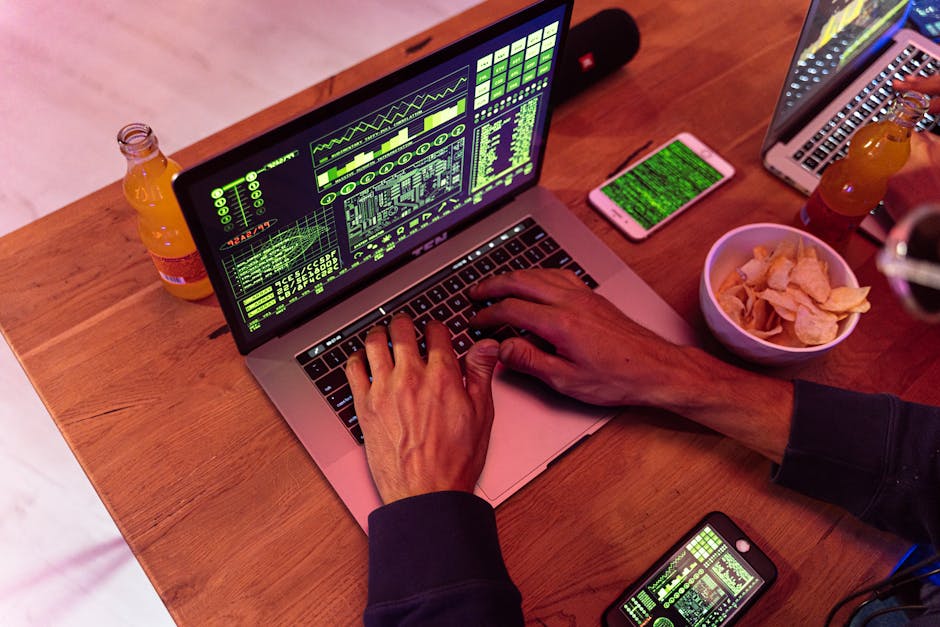Top Threats to Personal Data Security
Did you know that every day, over 30 million personal records are stolen worldwide? That’s a staggering statistic that reflects our digital age. With so much of our lives online, protecting our personal data is more important than ever. But what are the biggest threats to our data security? Lets dive into the top threats and how you can stay safe.
What Are the Top Threats to Your Personal Data?

When it comes to personal data security, several threats loom large. Here are the main culprits:
- Phishing
- Malware
- Weak Passwords
- Public Wi-Fi
- Data Breaches
Understanding these threats can help you recognize risky situations and act wisely. Lets explore each one in detail.
What Is Phishing and How Does It Work?

Phishing is a method that hackers use to trick you into giving away your personal information. They often send fake emails or messages that look real. For instance, you might receive an email that looks like it’s from your bank, asking you to verify your account. If you click the link and enter your details, you could be handing over your information to criminals.
In fact, according to a 2022 report, phishing accounted for over 40% of all cyberattacks. It’s a huge threat!
How Can Malware Compromise Your Data?

Malware, short for malicious software, is another significant threat. This includes viruses, spyware, and ransomware that can infiltrate your devices. Once installed, malware can steal your data or even lock you out of your files.
Imagine downloading a seemingly harmless app. If it contains malware, it can collect your personal information without you even knowing. Always download software from trusted sources and keep your antivirus software updated.
Are Weak Passwords Putting You at Risk?

Using weak passwords is like leaving your front door unlocked. Many people still use simple passwords, like “123456” or “password.” These are easy for hackers to guess. A strong password should be at least 12 characters long and include a mix of letters, numbers, and symbols.
Consider using a password manager. This handy tool can help you generate strong passwords and store them securely.
How Does Public Wi-Fi Affect Your Security?
We love free public Wi-Fi, but it can be a hotspot for hackers. When you connect to an unsecured network, your data can be intercepted. Hackers can easily see what you’re doing online and steal your personal information.
To stay safe, avoid accessing sensitive information while on public Wi-Fi. If you must use it, consider using a Virtual Private Network (VPN) to encrypt your data.
What Are Data Breaches and How Do They Happen?
A data breach occurs when unauthorized individuals access private data. This often happens due to weak security measures at companies. For example, in 2021, a significant data breach exposed over 500 million user accounts from a popular social media platform.
When companies experience breaches, your personal information, like email addresses and passwords, can be compromised. Regularly check if your email has been part of a data breach using tools like Have I Been Pwned.
What Can You Do to Protect Your Data?
Now that you know the threats, how can you protect yourself? Here are some practical steps:
- Use strong and unique passwords for each account.
- Enable two-factor authentication (2FA) wherever possible.
- Be cautious with suspicious emails and links.
- Regularly update your software and apps.
- Use a VPN on public Wi-Fi networks.
- Review privacy settings on social media platforms.
By taking these actions, you can significantly reduce your risk of becoming a victim of data theft.
What Are Some Common Misconceptions About Data Security?
Many people believe that they are safe because they don’t have anything valuable online. However, this is a dangerous misconception. Every piece of personal information, from your email address to your location, can be valuable to hackers.
Another myth is that antivirus software alone can keep you safe. While it helps, it’s not foolproof. Cybersecurity requires a multi-layered approach. Implementing various strategies will ensure better protection.
How to Stay Informed About Data Security?
The world of cybersecurity is always changing. Staying informed is vital. Follow trusted sources like the Cybersecurity & Infrastructure Security Agency (CISA) or subscribe to cybersecurity newsletters. They provide updates on the latest threats and how to protect yourself.
Additionally, you can read articles and resources about data security. This keeps you aware of new risks and solutions.
What Are the Consequences of Data Theft?
Data theft can have severe consequences. Victims can face financial loss, identity theft, and emotional stress. Imagine discovering that someone has used your identity to open credit cards or make purchases. It’s a nightmare!
According to the Federal Trade Commission, identity theft cases have increased by 45% in recent years. Protecting your data is not just smart; it’s necessary.
What Are the Takeaways for Personal Data Security?
Personal data security is crucial in todays digital age. Heres a quick recap of how to protect yourself:
- Be aware of phishing scams.
- Keep your devices free from malware.
- Use strong passwords and change them regularly.
- Avoid public Wi-Fi for sensitive activities.
- Stay informed about data breaches.
By following these tips, you can safeguard your personal data and reduce the risk of becoming a victim of cybercrime.
In conclusion, protecting your personal data isn’t just about technology; it’s about being informed, vigilant, and proactive. The digital landscape is changing, and so are the threats. Stay ahead of the game!
For more tips on staying safe online, check out our article on Internet Safety Tips.



